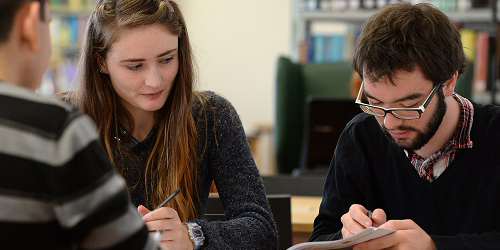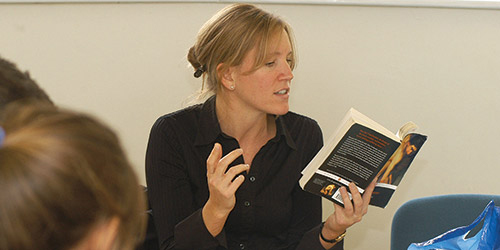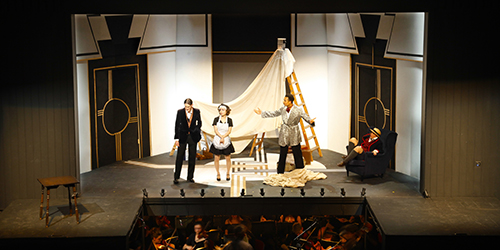English
Reading literature allows us to question our world, to discover new ideas and ways of being, to evaluate historical and cultural processes, and to think through the complexities of our own times.
Research leaders
Supported by world-leading scholarship, the Department of English offers innovative and research-led teaching.
Literary community
Take part in Bristol's literary scene. Enjoy festivals, societies, theatres and events.
First-class facilities
You'll study in our recently renovated Humanities Hub, home to new lecture theatres, flexible teaching spaces, a screening room, an exhibition area and a range of social spaces.
English courses for 2025
Single Honours
Joint Honours
- BA English and Classical Studies (QQ38)
- BA English and French (QR31)
- BA English and German (QR32)
- BA English and History (QV31)
- BA English and Italian (QR33)
- BA English and Philosophy (QV35)
- BA English and Portuguese (QR35)
- BA English and Russian (QR37)
- BA English and Spanish (QR34)
- BA Film and English (6T3X)
- BA Theatre and English (4CC8)
English at Bristol
At Bristol you'll be taught by world leaders in the field and have the opportunity to choose from a wide range of units every year. You'll be taught in small-group tutorials, seminars, lectures and, in the dissertation year, one-to-one tutorials.
Our campus is beautiful, including our gorgeous new Humanities Hub, and is woven into the larger community. Bristol is a fantastic literary city, home to the Bristol Festival of Literature, Bristol Women's Literature Festival and Bristol Poetry Festival, as well as a host of theatres, cafés, and independent bookshops. It has also inspired writers throughout its history, from William Wordsworth and Jane Austen to Helen Dunmore.
We are proud to include writers Angela Carter, David Nicholls and Jean-Marie Gustave Le Clézio among our alumni.
Bristol has a really rich, cultural, historical past. It's exciting to be able to talk about things that are difficult, to have awareness of the weight of our history. It's great to be able to study the character of the place that you're living in.
Career prospects

English graduates are highly sought after by employers for their versatility, research ability, critical thinking, creativity, and excellent writing and presentation skills. These very qualities have also made our graduates successful in entrepreneurial ventures. An English degree will help you to develop a broad, active, and flexible learning style as well as a range of communication skills and evaluative techniques.
We have a lively postgraduate community, and many of our students go on to study on master's programmes and research degrees, including English as well as areas like law, education, development studies, and many others.
Recent Bristol English graduates have obtained employment in the media, journalism, publishing, marketing, non-governmental organisations, the theatre, arts administration and teaching, as well as in industry, commerce, law, computing, accountancy, international relations and social work. Some have become successful novelists, playwrights and poets.
Course structure

As part of our intellectually rich and friendly community, you will study literature in English from the medieval period to the present, and learn exciting critical and theoretical approaches to literary study.
Year one supports your transition to undergraduate study and lays strong foundations, while also giving you the opportunity to choose optional units. Subsequent years allow greater freedom as you develop your own specialisations. You will have the opportunity to write a dissertation on a topic of your own choosing, with personalised one-to-one tutorials in your final year.
You will be taught by staff who come from all over the globe to produce world-leading research, so our special subject units really are 'special'; they incorporate a wealth of perspectives, including postcolonial theory, environmental studies, Black studies, gender studies, medical humanities, visual culture and comparative transhistorical literary studies, among others.
Our creative writing tutors have specialisms in poetry, fiction for adults, children's fiction, creative non-fiction, screenwriting and editing. Single honours students have the opportunity to study in Europe, Australia or North America for a semester. To find out more about studying abroad, visit the Centre for Study Abroad.
Vibrant community

There are plenty of opportunities to meet fellow book lovers outside of the classroom. The Falstaff Society organises poetry readings, theatre productions and creative writing groups, as well as popular social events. At the Afrolit Society you can get involved with book clubs, panel events and recitals focused on literature by African writers.
The SU also supports several theatre, creative writing and performance societies, and you can get involved in journalism with Bristol's student newspaper, Epigram.
